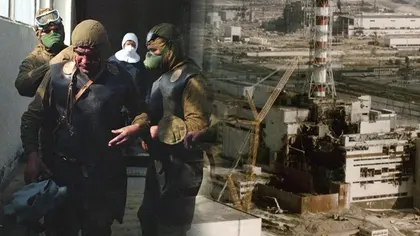On this day in 1986, the biggest technological disaster of the last century happened. We’ve hoped that the accident at the Chornobyl NPP would remain the largest man-made disaster in history. But, if we look at how mankind now behaves, there is little to hope for.
It is worth starting with why this text is very personal to me.
JOIN US ON TELEGRAM
Follow our coverage of the war on the @Kyivpost_official.
My father, Mykola Zhyzhyian, was a liquidator, one of the brave people who dealt with the consequences of the accident at the Chornobyl Nuclear Power Plant. He worked at the station for six months after the disaster, all the while being irradiated at a level very few people survive.
I remember well how my father returned home. The next two years became a test for the whole family, because the man, who had been completely healthy until then, was simply dying, slowly, and the doctors did not want to recognize a direct connection between the deterioration of his health and his time at the Chornobyl Nuclear Power Plant.
My father is not the only one. Because of the Chornobyl accident, more than 8.5 million residents of Ukraine, Belarus, and Russia received significant doses of radiation. Do not forget that almost half a million people died from diseases caused by nuclear radiation. Let's also remember that tens of thousands of people were evacuated from the infection zone. In the summer of 1986, 81 settlements in Ukraine became ghost towns.
My father's story, like the stories of thousands like him, who were recognized as victims of the accident at the Chornobyl nuclear power plant, is, first of all, a story about the indifference and cynicism of the state.

EU Transfers €1.5 Bln Raised From Russian Assets for Ukraine
The Soviet Union was a country where human life was worth zero, or even less. Perhaps it was then, that my father, who had been devoted to the ideals of the “Soviet man,” started to realize this.
The USSR after the Chornobyl tragedy was a colossus that was gradually dying, and whose clay legs, in the end, could not stand. After the accident at the Chornobyl Nuclear Power Plant, even die-hard communists understood that the Soviet Union was on its way to disintegration. With the Soviet Union’s fall, delusions, vain hopes, and animosities disappeared and dissolved into the air. What happened in the USSR, should never happen anywhere, ever again.
However, the last 25 years have shown that even this bitter experience hasn’t taught people anything. During the last quarter of a century, a shadow grew at Ukraine’s border – Putin's Russia became, in fact, a perverted reincarnation of the USSR. The ideology of the modern Russian Federation is a phantasmagorical mix of imperial complexes, Soviet cynicism, Orwellian doublespeak, and contempt for man.
Ukraine has been fighting this leviathan for 10 years. It was this monster that, two years ago, seized the Chornobyl and Zaporizhzhia nuclear power plants, and put humanity on the brink of another catastrophe.
By liberating the Chornobyl Nuclear Power Plant, Ukraine averted at least one repeat of the terrible 1986 tragedy. But the occupation of the ZNPP still poses a threat to everyone. And despite this, in the collective West there are still those who preach of “good Russians” and that the ephemeral “great Russian culture” is capable of defeating Putin, his minions, and his perverted ideology. But this is NOT SO!
So today, 38 years after the Chornobyl tragedy, we must once again remind everyone that Russia in its current form – Putin's Russia – is a constant, existential threat to civilization.
And this threat must be removed – in order to preserve the future of humanity.
You can also highlight the text and press Ctrl + Enter






